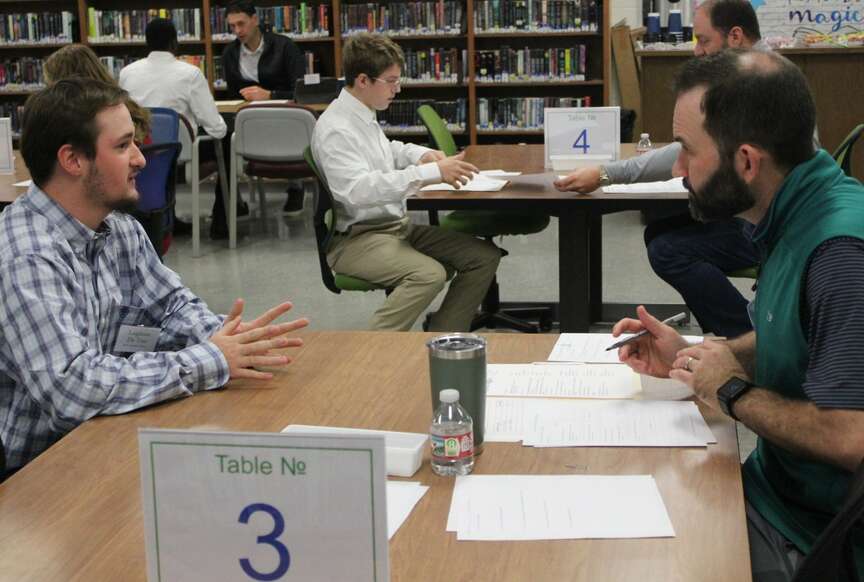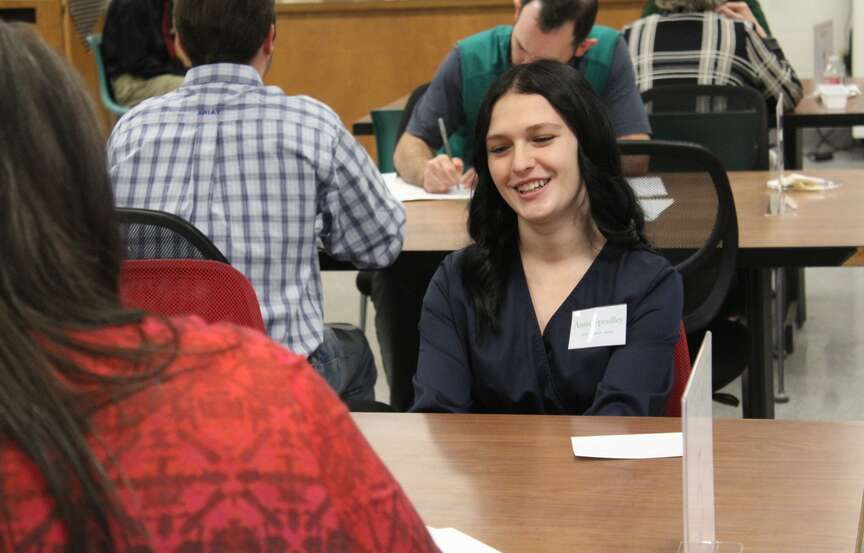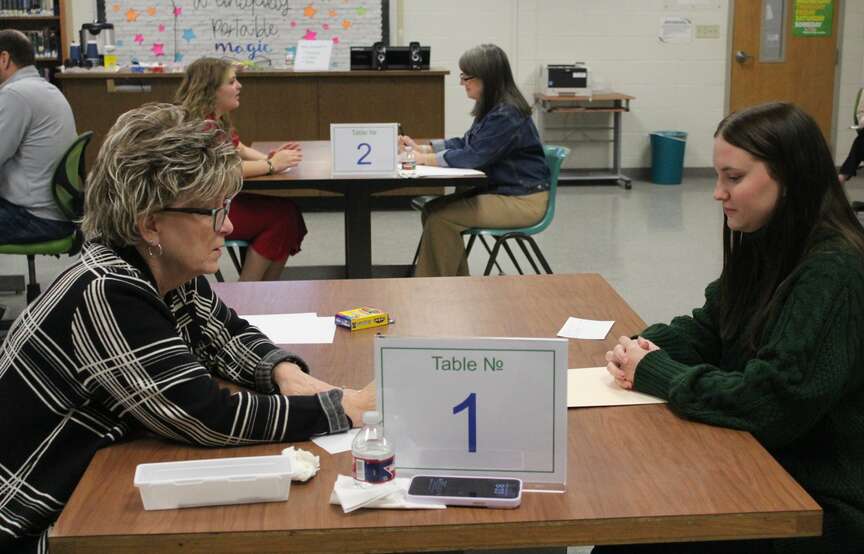With cellphones, email and social media, communication around the world is instantaneous.
But for Smackover teacher K.C. McBride, the approach to communication is a direct one.
"The state of Arkansas requires a semester course to graduate, which are either oral communications or professional communications," McBride said. "Smackover chose to do professional communications, which is what I teach. I took the class over last year, so this is my second year."
The class focuses on not only developing communication skills to help with job interviews but also nonverbal communication such as shaking hands and making eye contact. Résumés are also written to help students who could decide to enter the workforce after graduation.
On Wednesday, McBride's students got an up-close look at how job interviews were conducted, as representatives from area companies and businesses visited to conduct the interviews.
The process leading up to Wednesday's event began back in August and began to take shape in October.
"A month ago, we started working on our résumés," McBride said. "We had really been working on those on and off. Around the same time period, I gave them a list of questions that you would normally see in an interview. What are your strengths? Tell me about yourself. Tell me about a time you've overcome something challenging. Every interview is going to have something similar to that.
"I gave it to the kids and they wrote down their answers. Then I started teaching them on how to actually answer them. They want to write a one- or two-word answer but to give a good interview, you have to set up your question, give examples, explain how you learned from that, how you're going to grow and how you're going to take this into your job. When you hear them today, they can do that. They are all setting up their questions, giving examples, telling stories and not just the one- or two-word answers."
With their preparation complete, students rotated from one interview to the next one.
"It's like a portfolio as you would in a job interview," McBride said. "They show their résumé and then the person can ask them questions off their résumé or questions that they would ask when they're giving a real interview. They have follow-up questions, and the kids have to perform regardless of what they're asked. The people that I bring in, this is what they do or have done. They interview, hire people and look for qualified employees."
McBride said the response from the interviewers was positive.
"One thing that everybody told me was their manners," McBride said. "They were shaking hands, making eye contact, the 'yes sir,' 'no sir,' speaking positively during the interview and keeping it positive, sitting properly at a table. All of the feedback from the interviewers was that they were all very well-mannered. That's something that no matter your intellect level, everybody can have good manners."
McBride added that she was thrilled with the performance of her students.
"I'm just really proud of them," McBride said. "They were all dressed appropriately. Everybody took it seriously. They realized that this was a big deal. Some of my students met with me outside of school to practice. They said they practiced with their mom or dad or sister because they wanted to do well. That shows such maturity on their part. They knew how important it was, and they wanted to put their best foot forward."
The students were also happy with the results.
"It's hard to quantify, but I think now that they all have done it once, they have more confidence about it," McBride said. "After it was over, they were all really happy and excited. They feel that they've accomplished something -- and they have because we've been working on this since August."
The class also helps students prepare themselves for interviews with colleges.
"There's so many different tracks our kids can go on," McBride said. "Some are going to go right out into the workforce, some of them already have jobs, but then you have kids that are going to go to college. Some of the scholarships, you have to sit down and have an interview, some of the schools that are very competitive, you have to have an interview to get in. Even sports in college, some of them have an interview process."
If there is one consistency the class provides, it's getting students to become more comfortable with face-to-face communication.
"When you start this process with them, it's one- or two-word answers," McBride said. "Now they can articulate. They can give more of a paragraph answer than a one- or two-word answer. Their communication skills have grown. Even when they get those questions that they've never heard, something that's just off the cuff, they're able to come up with an intelligent answer because those communication skills have gotten stronger. That's not just verbally. We also learn about how important non-verbal communication is."
So what's next for the class?
"They will do a reflection sheet," McBride said. "They will give themselves a grade and say, 'What did I do well? What can I do better?' Make them reflect on their performance. Sometimes that's the best way to teach is by having them look at themselves closely. All of the people that interviewed did an evaluation sheet on every child, so they will get that information back and that will help them move forward and get better. The final step is we will write thank-you notes to all of the people that came. In the real world, that's what you do. That's proper manners."
McBride was pleased to see the work and experience pay off for her class.
"I think there's this idea that kids are only on social media and that they're not doing anything else and that they're angry or whatever. That's not true," McBride said. "My kids work. They go to high school, they go to college, they're involved in sports, they're so busy. I'm proud of them. I'm glad that they were able to shine and show themselves off to these people because not only do my kids learn, the interviewers are oftentimes surprised at how involved our kids are. They're always complimentary of our kids. I'm just really proud of them. They worked hard and it showed. I'm glad that they were able to gain some confidence in doing this because it is a big deal."



